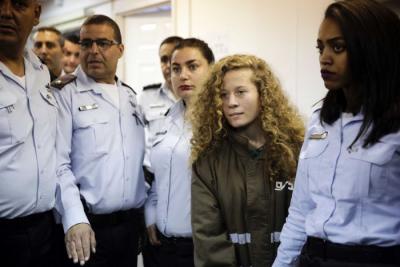
Last Wednesday, 21 March 2018, Ahed, Nariman, and Noor Tamimi were all sentenced under a plea agreement with the Military prosecutor. Ahed will serve 8 months in jail, receive a three year suspended sentence, and pay 5,000 shekels ($1,400 USD). Nariman will serve eight months, pay 6,000 shekels ($1,700 USD), and also receive a three-year suspended sentence. Noor received 2,000 shekels ($574 USD).
When considering the 12 counts brought against Ahed, the 8 month plea-bargain seems like quite a lenient sentence. A young girl, who was potentially going to lose her youth, should be out of jail in time for her end of high school exams. While this sounds relatively reasonable, as far as international law is concerned, there is nothing normal about it.
For the case of Ahed, she was tried in the occupation’s Juvenile Military Court. The court itself was established under Military Order 1644 of 29 July 2009. It was initially to apply only to children of under 16 years. Military Order 1727 , of 2013, extended the age to 18.
Besides the fact that the Juvenile Court must take place in a separate room, the only added protections are that the judge must be qualified for the task and that the individual’s family may be in attendance. There is a paragraph in the order that considers the potential for the child’s rehabilitation, and engagement with a probation officer, but this is not required of the court.
Israel bears certain obligations to the children of the occupied population under both international humanitarian law (IHL), and international human rights law. Besides general statements concerning food and medicine, the primary prescription for actions under IHL comes in Article 38 of the Fourth Geneva Convention of 1949. Stated in part 5, “Children under fifteen years…shall benefit by any preferential treatment to the same extent as the nationals of the State concerned.” Taking into account the insight of the Commentary of 1958, published by the International Committee of the Red Cross, this essentially means that children under 15 years are to be afforded preferential treatment in essentially all regards.[1]
The primary instrument under human rights law is the Convention on the Rights of the Child, which Israel ascended to in 1991. In Article 3, the principle of the best interest of the child is emphasized. The article stresses that, “in all actions concerning children, whether undertaken by public or private social welfare institutions, courts of law, administrative authorities or legislative bodies, the best interests of the child shall be the primary consideration.”[2]
According to General Commentary 14 (2013) from the Committee on the Rights of the Child, this means that there is an “obligation to ensure that all judicial and administrative decisions as well as policies and legislation concerning children demonstrate that the child’s best interests have been a primary consideration.”[3]
Additionally, Article 27(b) states that, in the case of arrest, “the arrest, detention or imprisonment of a child shall be in conformity with the law and shall be used only as a measure of last resort and for the shortest appropriate period of time”.[4]
It is evident that in the case of Ahed, international law is not being followed in regard to both the sentence, and the institution.
Firstly, there is no requirement that the Juvenile Military Court look to the possibility of ‘reformation’ or not sentencing the child to prison. Despite the fact that there is a limit on the period of time a child under 16 can be sentenced to, there are loopholes and ways to get around such a restriction.
Secondly, there is no way that the treatment that Ahed endured would be met out against a child who is a Jewish citizen of the occupying state.
Finally, it is evident by the fact that Ahed is serving jail time at all that her best interests have not been taken into account.
What must be emphasized is that Ahed’s case is not unique. Rather than saying that the occupation sentenced her to jail time as to make an ‘example’ of her, it is the case that her sentence was reduced due to international attention. The occupation’s ultimate aim is to control a population. These goals extend beyond international law and the basic rights of the child. Ahed’s case is just the tip of the iceberg.
Addameer calls on international civil society to continue its pressure on the occupying state. It is not acceptable to deal with Israel as if it is a state that abides by international law and norms when it continues to treat children in this way. Additionally, we call on the international community to place pressure on the occupying state with the intent of ensuring that it abides by its international obligations.
[1] Commentary: IV Geneva Convention Relative to the Protection of Civilian Persons in Time of War, Jean S. Pictet (Ed.), (Geneva: International Committee of the Red Cross, 1958), p. 248.
[2]’Convention on the Rights of the Child 1989’, http://www.ohchr.org/EN/ProfessionalInterest/Pages/CRC.aspx
[3] ‘General Commentary No.14 (2013)’ Committee on the Rights of the Child, 2013: http://tbinternet.ohchr.org/_layouts/treatybodyexternal/Download.aspx?s….
[4]Ibid.